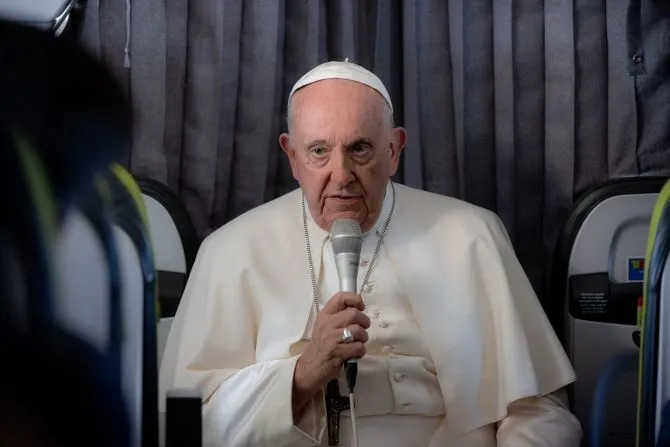The Holy Father also shared his impressions of World Youth Day — the fourth he’s attended as pope.
The attendance in Lisbon, he noted, was “impressive,” pointing to estimates that as many as 1.4 million or more attended the Saturday evening vigil. In addition to this youth event being “the most numerous” it was the “best prepared,” he added.
“The young people are a surprise. Young people are young, they act youthful, life is like that. But they are seeking to move forward. And they are the future. The idea is to accompany them,” he said.
“The problem is knowing how to accompany them,” the pope continued. “And that is that they shouldn’t detach themselves from their roots. That’s why I insist so much on dialogue between old and young, between grandparents with grandchildren. This dialogue is important, more important than the parent-child dialogue. The grandparents, the roots. Young people are religious. They seek faith, not something artificial … They seek an encounter with Jesus.”
He added: “Some people say, ‘But young people don't always live life according to morality.’ But who among us has not made a moral mistake in his life? Everyone has.
(Story continues below)
“There should be commandments. Each of us has our own downfalls in our own history. Life is like that. But the Lord is always waiting for us because he is merciful and [he is] Father and mercy goes beyond everything,” he said.
During the 25-minute in-flight press conference, Pope Francis stressed that mental health and suicide are serious issues facing young people today and that he does not believe that it is discussed enough by the media.
The pope revealed that a young man had confided in him (not in the context of confession) that he had considered committing suicide last year.
“Youth suicide is a major issue today,” the pope added.
“So many young people are anxious and depressed … In some countries that are very, very demanding at the university, young people who do not succeed in getting a degree or finding a job, (and) commit suicide because they feel great shame.”
In the press conference, Pope Francis also touched on the membership of the Catholic Church and access to the sacraments. A journalist recalled the pope’s own words during the World Youth Day welcome ceremony Aug. 3, that, “In the Church, there is room for everyone, for everyone,” and asked why women and homosexual people cannot access every sacrament.
Pope Francis said the question concerned two different aspects of ecclesiology: the membership of the Church and its regulations.
“What you say is a simplification: ‘He cannot participate in the sacraments.’ This does not mean that the Church is closed,” Francis said.
He emphasized that the Church welcomes everyone, including homosexual people.
“The Lord is clear: the sick and the well, the old and the young, the ugly and the beautiful, the good and the bad. Even the immoral [person], which is bad, but the immoral too,” he said.
Pope Francis described the Church as a mother who guides her children in the maturation of their faith through prayer, interior dialogue, and dialogue with pastors.
“In [ministry], one of the important things is patience: accompanying people step by step on their way to maturity,” he said. “Each one of us has this experience: that the Mother Church has accompanied us and accompanies us in our own path of maturation.”
“I don’t like the reduction,” he added. “This is not ecclesial, it is gnostic. … A certain Gnosticism that reduces ecclesial reality, and that doesn’t help. The Church is ‘mother,’ receiving everyone, and everyone makes their own way within the Church, without advertisement, and this is very important.”





 Pope Francis listens to questions from journalists aboard the papal flight to Rome on Aug. 6, 2023, following his visit to Portugal and World Youth Day in Lisbon. Daniel Ibáñez/CNA
Pope Francis listens to questions from journalists aboard the papal flight to Rome on Aug. 6, 2023, following his visit to Portugal and World Youth Day in Lisbon. Daniel Ibáñez/CNA


